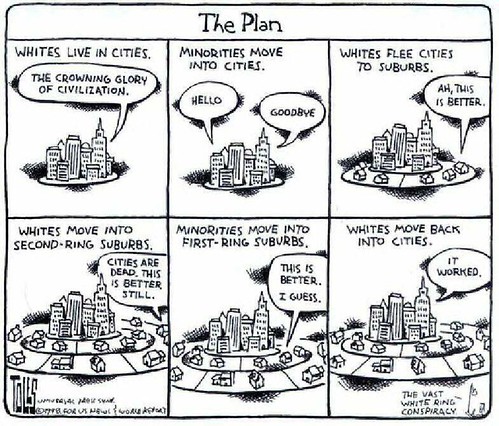Is smart growth racist?

Tom Toles editorial cartoon on gentrification from 1998, when he was at the Buffalo News.
According to economist Thomas Sowell, in an op-ed column in the Examiner, "Democrats, environmentalists pushing Blacks out of their neighborhoods," yes.
From the article:
The black population of San Francisco is less than half of what it was in 1970, and it fell another 19 percent in the past decade. ... Blacks are being forced out of San Francisco, and out of other communities on the San Francisco Peninsula, by high housing prices.
At one time, housing prices in San Francisco were much like housing prices elsewhere in the country. But the building restrictions -- and outright bans -- resulting from the political crusades of environmentalist zealots sent housing prices skyrocketing in San Francisco, San Jose and most of the communities in between. Housing prices in these communities soared to about three times the national average.
The black population in three adjacent counties on the San Francisco Peninsula is just under 3 percent of the total population in the 39 communities in those counties.
As a result, there is no question that as center cities become more attractive once again, people with more money displace people with less money. Some people call this "gentrification" or the result of neoliberal development policies.
-- review of the book Gentrification, by Lees, Slater, and Wyly
-- Gentrification and Resistance in New York City" from Shelterforce, by Newman and Wyly.
But the reality is that it's about money and demand. E.g., I considered applying for a dream job in San Francisco (I ended up not), but during the process of consideration, living in San Francisco was never an option--even with a job paying $100,000+, but Oakland, where great houses can be bought for under $450,000 was on my radar.
The funny thing is that this situation of expensive housing is "produced" in large part by the right, because anti-tax efforts such as the movement that spawned Proposition 13 in California led to a massive restriction on tax revenues for local municipalities.
Local governments were then driven even more to take up various private-public partnerships in order to provide services, leverage capital, and to attract high income residents who demand little in the way of municipal services, as opposed to low income residents who demand a great deal in the way of municipal services (housing assistance, social services, educational services, health services, etc.).
These efforts, which have been successful in many communities, are now being called racist by the right, and people like Thomas Sowell.
This is an intellectual convenience, because the anti-tax right is looking for reasons to criticize any and all regulations on building and the use of property, and a frquent criticism raised by the right on smart growth is that it somehow restricts supply and therefore cost of property does go up.
There is no question that urban growth boundaries do limit supply in a metropolitan region, but given that most center cities are faced with thousands of vacant or underutilized properties, the argument often isn't relevant, but a subterfuge.
The issue is that great places are in great demand, and unless extraordinary steps are taken, such as by removing desirable property "from the market" through land trusts, portfolio investments by enlightened nonprofits, and government support, people of lesser means will be displaced.
But it's not about smart growth. It's about economics.
I guess the market is racist.
No, the market is about economics.
And it sucks to not have money. Because then you can't participate in the market.
Labels: gentrification, housing market, invasion-succession theory, public finance and spending



0 Comments:
Post a Comment
<< Home